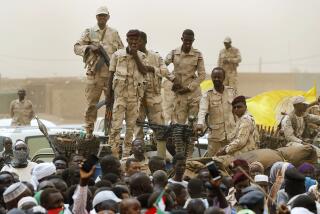U.S. Religion Commission Cites Major Abuse in China
- Share via
WASHINGTON — An interfaith commission established to advise Congress and the White House on combating religious persecution called on the United States on Monday to deny China normal trade relations until it stops repressing Christians, Muslims, Buddhists and others.
In its first report, the year-old U.S. Commission on International Religious Freedom also called on the Clinton administration to provide aid to rebel forces in Sudan if religious persecution continues in that African country, a step the White House has consistently resisted, in addition to issuing a sharp rebuke to President Clinton’s China trade policy.
“It is impossible to ignore the serious deterioration in religious freedom during the past year in China,” said Michael K. Young, dean of George Washington University’s law school and commission vice chairman. “We’re talking about three-year labor camp sentences without trial, about multiyear prison terms, about people--including women--beaten to death by police” for trying to practice their religion.
If Congress approves Clinton’s legislation giving China permanent normal trade status without insisting on a greater respect for religious freedom, Young said, the vote will “send Beijing a signal that these awful, inexcusable, inhumane policies do not require a more immediate response.”
The commission said that if Congress decides to award Beijing normal trade relations, it should first announce annual hearings on human rights and religious freedom in China, in effect continuing the debate that has accompanied the yearly renewal of China’s trade status. For good measure, the panel said the lawmakers should invite the Dalai Lama, exiled head of Tibetan Buddhism, to address a joint session of Congress, a step sure to infuriate China.
State Department Calls Conditions Misguided
Responding to the report, the State Department said the commission’s recommendation regarding China’s trade status is misguided.
“We profoundly believe that conditionality will not advance the cause of religious freedom in China and will not improve the circumstances of any of the religious adherents about whom we are all deeply concerned,” the department said in a written statement.
The nine-member panel appointed by the president and the congressional leadership focused on China, Sudan and Russia, although it also offered brief criticism of Egypt, Indonesia, Iran and Vietnam. Other nations weren’t studied because the panel ran out of time, staffers said, so a country’s omission from the report doesn’t mean that it received a clean bill of health.
Sudan drew the commission’s harshest criticism. The report accused the Muslim-led government of systematic “genocide” against Christians, followers of traditional African religions and even dissident Muslims during a 17-year civil war. The panel said at least 2 million people have died in the war, most of them followers of minority religions.
The report said the war has a number of causes, but it said religious repression is the most important. Although the Sudanese government has launched a concerted effort to convince the world of its good intentions, Rabbi David Saperstein, the commission chairman, said conditions have gotten steadily worse.
“In the last year, in particular, the government has escalated an appalling policy of deliberately bombing civilian facilities in the [rebel-held] south: It has repeatedly hit churches, schools, hospitals and the facilities of aid organizations,” Saperstein said.
On Sudan, Panel Seeks ‘Vigorous Campaign’
The commission said that the United States has done more than any other country to combat religious persecution in Sudan but that it is not nearly enough.
The panel urged the administration to increase diplomatic and economic pressure on the government and to “launch a vigorous campaign, led by the president, to inform the world of Sudan’s war crimes, crimes against humanity and genocidal activities.”
If, after a year, the human rights violations haven’t diminished, the commission said, the U.S. government should “provide nonlethal aid to appropriate opposition groups.” Congress authorized food and logistical assistance to the rebel Sudanese People’s Liberation Army last year, but Clinton has refused to spend the money because nongovernmental humanitarian organizations said the step would only make things worse.
The recommendation to assist the rebels was the only proposal in the report that wasn’t adopted unanimously. Panel member Laila Al-Marayati, past president of the Los Angeles-based Muslim Women’s League, complained that the rebel army is also guilty of human rights abuses.
The panel also called on the United States to try to establish a military “no-fly” zone over Sudan “using peaceful means.” A commission staffer acknowledged that no-fly zones, such as the ones over much of Iraq, require military enforcement. But he indicated that the commission was unable to agree on the use of force.
Religious freedom in Russia “is dramatically better than during the Soviet period,” the report said. Nevertheless, it said Russian authorities, at the national and regional levels, give preference to the Russian Orthodox Church, often harassing other religious groups such as Protestants, Catholics and Muslims.
A 1997 law established a difficult registration procedure for religious groups that weren’t operating in Russia 15 years before. In effect, the law authorized Russian Orthodox, Muslim, Jewish and Buddhist groups while restricting all other religions.
“Most alarmingly, President-elect [Vladimir V.] Putin issued a decree in March which, while extending the registration deadline until Dec. 31, 2000, would require the [abolition] at that time of all nonregistered groups,” the report said.
It called on the administration to press Putin to withdraw the order.
More to Read
Sign up for Essential California
The most important California stories and recommendations in your inbox every morning.
You may occasionally receive promotional content from the Los Angeles Times.













